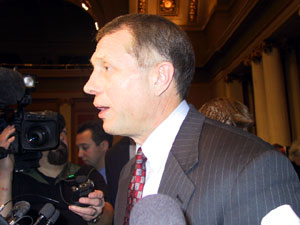Legislature returns, and so does effort to expand gambling in Minnesota
February 2, 2004
 |
| Republican House Speaker Steve Sviggum of Kenyon is a recent convert to the racino plan. He says the possible budget shortfall -- plus Senate Democrats' hopes to borrow more heavily than Republicans want -- will require that new revenues come from somewhere. The racino, he says, is the only realistic option. (MPR Photo/Laura McCallum) |
St. Paul, Minn. — The opening gavel fell at noon in both House and Senate, welcoming lawmakers back to what many had predicted would be a short legislative season.
Both bodies quickly dispensed with several procedural and ceremonial items of business and adjourned shortly afterwards. But the quick start is no predictor of the work ahead. Legislative leaders have said recently that they've been warned that the state's next budget update -- the one all dollar discussions will work off of -- could show a larger deficit than the relatively modest $185 million shortfall envisioned last fall.
Gov. Tim Pawlenty, too, acknowledged the good times haven't quite returned. "Job numbers are not coming back as fast as we had hoped. So there's not going to be this miracle recovery where all of the sudden we have a bunch of new surplus money. We're still going to have a little bit of budget deficit work to do. This deficit is not entirely solved," he said.
Just how big the deficit is likely to be and whether it will outgrow the $600 million tucked away in the state's rainy-day fund are unknown. But shortfalls, even moderate ones, could present headaches to policy makers who've already exhausted the easy solutions of draining reserve accounts and shifting costs into later years, not to mention the not-so-easy solutions of cutting budgets.
Republicans in the Legislature, however, say they've hit on an obvious remedy: casino gambling. Senate Minority Leader Dick Day of Owatonna has been vocal advocate for installing slot machines at the Canterbury Park Racetrack in Shakopee. Currently, the state's existing 18 casinos are run by Native American tribes who are not required to share gaming revenues with the state.
Day says the "racino" plan could produce $75 million a year for the state. "I don't get it," he said Monday. "I just don't get. It baffles me. We have 18 of them. It's a $3 or $4 billion industry. We're the only state in the United States that doesn't get any revenue from our casinos."
The House approved the racino last year. That vote still stands, meaning any further movement will require the Senate to act similarly.
But incoming DFL Senate Majority Leader Dean Johnson of Willmar says, despite Day's protestations, there appears to be little appetite for new gaming.
"In my personal opinion -- not the caucus opinion -- I think we have enough gambling. But a larger question is should the state of Minnesota, should a state government be the promoter of gambling?" Johnson said.
The racino has so far seen the most legislative success, but it's by no means the only plan. Three separate proposals would authorize a new metro-area to fund -- take your pick -- college scholarships, pro sports stadiums, or economic development. All are adamantly opposed by most of the state's Native American tribes, who worry that new gaming facilities will undercut their already successful operations.
Conservatives have also opposed new casinos on moral grounds. And until recently, Gov. Tim Pawlenty has been a dependable critic. That may be changing. He now says he's ready to discuss the future of gaming in Minnesota.
"Even though I've got my personal views on it, when you have this much pressure and this much activity in an issue area, it's important for me to step forward and say we're going to try to lead the discussion, if not the result," Pawlenty said.
Whether gambling bills can advance will depend on how that pressure builds, and from what direction. Republican House Speaker Steve Sviggum of Kenyon is a recent convert to the racino plan. He says the possible budget shortfall -- plus Senate Democrats' hopes to borrow more heavily than Republicans want -- will require that new revenues come from somewhere. The racino, he says, is the only realistic option.
"You then have to ask the Senate Democrats, well, if you want to create these jobs in the public sector and build, how are you going to find the money to pay for that debt service? Where is it going to come from?"
That debate will begin in earnest at the end of the month, when February budget forecast is released.
|
News Headlines
|
Related Subjects
|

